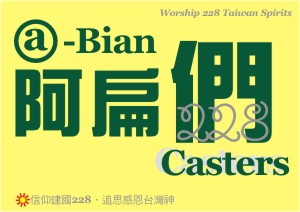Published on Taipei Times
http://www.taipeitimes.com/News/editorials/archives/2008/12/26/2003432121
The death of de facto sovereignty By Lin Cho-shui 林濁水
Friday, Dec 26, 2008, Page 8 Recently, two inconspicuous but contradictory news items appeared in the media. Last month, the Ministry of National Defense changed the title of “military attache” for Taiwan’s military representative organization in Washington to “secretary.”
The second was a comment by Vice Minister of Foreign Affairs Andrew Hsia (夏立言). In response to a question from a Democratic Progressive Party legislator, Hsia said the nation’s bid to join the WHO might succeed.
The former represents a failure for Taiwan’s international participation, while the latter suggests a diplomatic breakthrough. If we look at these items in tandem with a string of surprising cross-strait and diplomatic policies under President Ma Ying-jeou (馬英九), the government’s strategy to orientate Taiwanese identity as a quasi-client state of China becomes clear.
The title “military attache” can be used only when two countries have formal diplomatic ties. When Taiwan and the US severed diplomatic ties, China opposed Taiwan stationing a military attache in Washington, and it took Taiwan a lot of effort to convince the US to allow it to keep the posts. These posts and the diplomatic immunity given to US-based Taiwanese officials are symbolic remnants of Taiwan’s sovereignty.
Unexpectedly, military attaches have now been downgraded to secretaries. Although this conforms to Ma’s cross-strait diplomatic truce, the move has drawn severe criticism from both ruling and opposition parties.
As for the WHO bid, a majority of the public thinks it is just another irresponsible promise made by the government.
Taken together, these contradictory developments suggest a form of cooperation between the Chinese Nationalist Party (KMT) and the Chinese Communist Party (CCP) in which Beijing holds the initiative.
Regardless of how the international situation changes, the fact is that Taiwan is a de facto independent, sovereign state, but rarely recognized as a de jure independent country. Neither Taiwan nor China can change this state of affairs, although neither senior members of the KMT nor Beijing accept this view. It was not until after 1990 that former president Lee Teng-hui (李登輝) adopted a more pragmatic diplomatic approach and recognized the concept of “one China, with each side having its own interpretation,” a standpoint strongly opposed by China.
Since then, China has not had a smooth ride in blocking Taiwan from taking part in international organizations. Taiwan has improved semi-official relations with other countries and has joined the WTO. As a result, since 2000, China has adopted a new strategy: oppose Taiwan’s de jure sovereignty while not denying de facto sovereignty.
Ever since the KMT deprived Lee of his party membership, the party has leaned toward the principle of “one China.” Through consultation and negotiations with the CCP, the KMT has effectively abandoned support for “one China, with each side having its own interpretation.”
From Ma’s perspective, China has emerged as a new political and economic power in the international community and will become the only supporter of Taiwan’s economy. It is impossible for Taiwan to pursue sovereignty, so the reasoning goes, but it won’t easily accept “one country, two systems.”
Therefore, Ma has defined Taiwan as a local Chinese government; advocated a diplomatic truce that does not accept dual recognition but removes Taiwan from national symbols; given up pursuit of a UN seat in a bid to secure membership in special UN agencies; cracked down on the display of national flags during Association for Relations Across the Taiwan Strait Chairman Chen Yunlin’s (陳雲林) visit to Taipei; and inked agreements allowing direct sea and air transportation links defined as “special routes,” even though they are regarded as domestic routes.
Now, after all this, the government has renamed its military attaches in the US to show that it is weakening military relations with Washington.
Big steps backward in the international, cross-strait and domestic arenas have inflicted considerable harm on the nation’s sovereignty.
Worse, the government is cooperating with a requirement in China’s “Anti-Secession” Law that Taiwan obtain approval from China before joining international organizations.
This is most obvious in the case of Taiwan’s bid to join the WHO. Taiwan is already a member of the WTO, an organization far more important than the WHO. The international community therefore did not necessarily side with China’s block on WHO participation.
Had former president Chen Shui-bian (陳水扁) not raised his requirements for WHO membership, Taiwan would have been able to join the organization long before the transition of power. Instead, Chen passed the job to Ma, who is now asking China for permission to join the WHO. China is, of course, likely to exercise flexibility in regard to participation in order to advance its agenda of unification.
Ma’s cross-strait diplomatic strategy can be analyzed thus: Taiwan’s status is above Hong Kong’s because the former still enjoys autonomy and elects its own president and legislature. But its status is beneath that of Belarus and Ukraine under the Soviet Union because Taiwan cannot be a member of the UN. Its status is also lower than imperial China’s tributary states — Korea, for example — because Taiwan has less diplomatic freedom. Taiwan has abandoned not only its de jure, but also its de facto sovereignty.
Taiwan’s international status, as defined by the Ma administration, has more sovereignty than in “one country, two systems,” but a lot less than imperial client states. Taiwan has given up its claim of being an independent and sovereign state; it is now a quasi-client state.
Under this definition, it is not surprising that Taiwan would ask for Chinese approval to join the WHO or downgrade its US-based military attaches.
The question is if the Taiwanese public is prepared to accept this state of affairs without complaint.
Lin Cho-shui is a former Democratic Progressive Party legislator.
TRANSLATED BY TED YANG
|
![]()


0 Comments:
Post a Comment